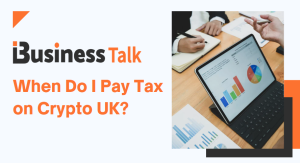
How to Avoid Paying Tax on Cryptocurrency UK?
Introduction
Cryptocurrency has taken the world by storm. It’s a digital currency, meaning that it only exists electronically and can be sent to other people without requiring a physical exchange like with pound notes or coins. For example, if you own some bitcoin and you want to buy a new game from Steam, you simply transfer your bitcoin over to the game’s developers, and they’ll know how much they need to send you in return.
Most people know that they need to declare any earnings they make from trading or mining cryptocurrency. However, there are different rules to follow depending on the type of crypto you are trading or mining. This blog post will cover which cryptocurrencies you need to declare and how to avoid paying tax on other types of crypto.
What is the UK’s stance on cryptocurrency?

The United Kingdom is one of the most proactive countries when it comes to cryptocurrency regulation. The UK’s Financial Conduct Authority (FCA) has been supportive of blockchain technology and its potential applications. In March 2018, the FCA published a discussion paper on distributed ledger technology (DLT), including a section on crypto assets.
The FCA has also clarified its position on initial coin offerings (ICOs), stating that ICOs may fall outside of current regulations depending on the structure of the project. The FCA is monitoring developments in the ICO market and will continue engaging with firms involved in ICOs.
The UK government has also been supportive of cryptocurrency and blockchain technology. In 2016, the government launched a fintech Sandbox which allows startups to test new products and services in a regulatory environment. One of the startup private limited companies accepted into the Sandbox was a blockchain startup called SETL which is developing a DLT-based platform for securities settlement.
Overall, the UK is taking a positive stance toward cryptocurrency and blockchain technology. The country is supportive of innovation and is open to testing new technologies in a regulatory environment.
How is Cryptocurrency Taxed in the UK?

Cryptocurrency is taxed in the UK in a similar way to other investments. Capital gains tax is payable on any gains made from selling cryptocurrency, and income tax is payable on any interest or dividends earned from holding cryptocurrency.
There are a few key things to remember when it comes to cryptocurrency taxes in the UK:
- Cryptocurrency is classed as property for tax purposes, so capital gains tax rules apply.
- If you’re trading cryptocurrency, you may be liable for income tax on any profits you make.
- Losses on cryptocurrency can be offset against other capital gains for tax purposes.
- Foreign currency gains and losses incurred from buying and selling cryptocurrency are also subject to capital gains tax.
How to Calculate Your Taxes When Trading Cryptocurrency in the UK?

If you’re trading cryptocurrency in the UK, you need to be aware of the taxes you’ll need to pay on your gains. Here’s a quick guide on how to calculate your taxes when trading crypto.
When it comes to cryptocurrency taxes in the UK, you’ll need to pay Capital Gains Tax (CGT) on any profits you make from selling crypto. CGT is calculated as a percentage of the total gain you’ve made from selling crypto and is charged at a rate of 18% or 28% depending on your tax bracket.
When Do I Pay Tax on Crypto UK?

If you trade cryptocurrency, you may need to pay taxes. Here are some things to know about cryptocurrency and taxes.
The first thing to know is that cryptocurrencies are not considered legal tender in the UK. This means that they are not subject to VAT. However, if you buy goods or services with cryptocurrency, you may still be liable for VAT.
You may need to pay income tax if you earn from cryptocurrency. This includes any income from trading, mining, or accepting cryptocurrency as payment. If you are self-employed, you will also need to pay National Insurance contributions.
Capital gains tax may also apply if you sell cryptocurrency for more than you paid for it.
Cryptocurrency is not currently regulated in the UK. This means that there are no specific rules about how it should be taxed. The government has said that it is considering introducing regulation but has not yet done so.
In the meantime, you should keep records of all your cryptocurrency transactions and report them to HMRC if you think you owe tax.
How to Avoid Paying Tax on Cryptocurrency UK?

If you’re based in the UK and are looking to avoid paying taxes on your cryptocurrency holdings, you can do a few things. First, make sure that you are only trading cryptocurrency for personal use and not for profit. If you’re found to be trading cryptocurrency for profit, you may be liable for capital gains tax.
Investing in a well-diversified portfolio is the best way to avoid paying capital gains tax on cryptocurrency. By investing in various assets, you can minimize your exposure to any particular asset and reduce the likelihood of paying capital gains tax on your investment. If you’re looking to avoid paying tax on your crypto profits, a few options are available.
One option is to use a CGT-free exchange, such as eToro, which doesn’t charge CGT on crypto sales.
Another option is to hold your crypto in a tax-free wrapper, such as an Individual Savings Account (ISA) or a Pension credit. This way, any gains you make on your crypto will be tax-free. If you hold your investment for more than one year, you will be eligible for the long-term capital gains tax rate, which is typically lower than the short-term capital gains tax rate.
If you’re a UK resident but not a UK taxpayer, you may be able to claim back the CGT you’ve paid on your Crypto gains by completing a self-assessment tax return.
Finally, you can avoid paying capital gains tax on cryptocurrency by using a qualified retirement account, such as a 401(k) or an IRA. Contributions to these accounts are typically not subject to capital gains tax. Remember to report any profits or losses from your cryptocurrency trading activity to the HMRC. By doing so, you’ll be able to offset any gains against losses and lower your overall working tax bill.
Conclusion
There are a few ways to avoid paying tax on cryptocurrency in the UK, but they all require some level of planning and foresight. If you trade frequently, consider using a CGT-exempt account. If you hold your cryptocurrency for long-term investment, you can defer or eliminate CGT by carefully timing your sales. And finally, donating cryptocurrency to charity can do so without incurring any tax liability.







